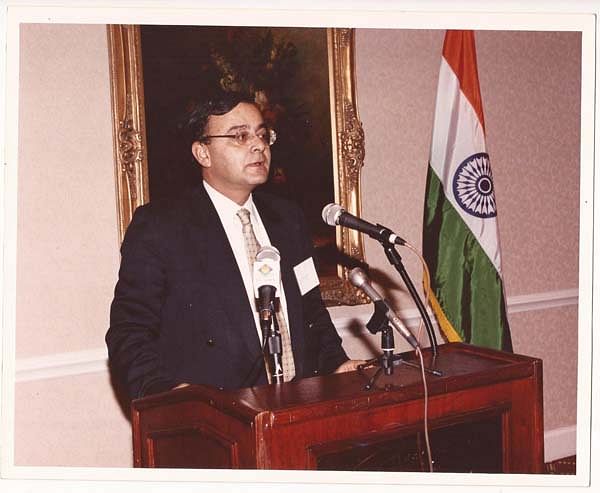
PepsiCo, Coca-Cola, BJP's LK Advani, Congress' Madhavrao Scindia, JD(U)'s Sharad Yadav, and the Birla family. No, they aren't random names strung together. A common thread named Arun Jaitley ties them all together -- all of them were the former finance minister's clients in his former law universe.
While his political activism as a student, which included being an integral part of the JP movement, a 19-month-long preventive detention during the Emergency in 1975, among other things, put him on the political map, the legal sector was another space where Jaitley carved out a niche for himself.
Born to a lawyer father, Jaitley started practising in New Delhi after graduating from Delhi University with an L.L.B. degree in 1977.
Since then, he has practised in several courts in New Delhi, the Delhi High Court as well as the Supreme Court, juggling law and politics as he marched forward.
At the age of 37, in 1989, Jaitley was appointed Additional Solicitor General of India in the short-lived V P Singh government under which he is said to have done the paperwork related to the Bofors scandal investigation which had implicated many Congress heavyweights, including former Prime Minister Rajiv Gandhi.
Read More: RIP Arun Jaitley | Former Finance Minister's mortal remains transported to his residence from AIIMS
In 1990, Delhi High Court designated him as a senior advocate. One high point of his legal career was his delegation to the United Nations General Assembly in 1998 on behalf of the Indian government where the Declaration on Laws Relating to Drugs and Money Laundering was passed.
In the Atal Bihari Vajpayee government, between 1999 and 2004, Jaitley held a number of portfolios, one of them being the Cabinet Minister for Law and Justice, which he took over from eminent lawyer Ram Jethmalani. He stepped down from the role for a while, took up the role of the BJP's General Secretary in 2002, rejoined the cabinet shortly after and took charge of the Ministry of Law and Justice and Ministry of Commerce & Industry till the end of Vajpayee government's term.
During the brief period when he didn't hold any ministerial position in 2002, the former Union Minister of Law represented the multinational food giant PepsiCo in a Supreme Court case against the company, its rival Coca-Cola and around 41 other companies for large-scale vandalism along the mountain road leading to Rohtang Pass from Manali in Himachal Pradesh where rock faces were defaced by advertisements, some of them also nailed to the trees along the stretch.
In another case in 2004, the Rajasthan High Court had asked both Coca-Cola and PepsiCo to print the extent of pesticide residues in their products on the soft drinks containers. Jaitley had challenged the order and fought on behalf of Coca-Cola this time.
Jaitley also presented a paper on law before the Indo-British Legal Forum talking about corruption and crime in India.
Jaitley's careers in law and politics walked hand in hand until he finally quit practising law in 2009.
After that, Jaitley rose through the ranks in the BJP and was sworn in as the Finance Minister in the first Narendra Modi Cabinet in 2014. Thereafter, Jaitley was seen as one of Prime Minister Modi's closest wingmen who helped him steer through key economic decisions like demonetisation and GST, a leader considered to be one of the BJP's top strategists.